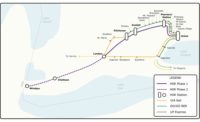 |
|
REID (Photo courtesy of Sen. Harry Reid's Office) |
The new Senate Democratic leader, Harry Reid of Nevada, pledges to seek consensus with congressional Republicans, but also indicates that there are limits to how much he will compromise. To engineering and construction industry officials, Reid, a senior Appropriations and Environment and Public Works Committee member, is viewed as a defender of federal infrastructure spending.
Reid, 64, was formally elected Nov. 16 by his fellow Senate Democrats as the minority leader in the 109th Congress. He succeeds Tom Daschle of South Dakota, who lost a re-election bid on Nov. 2 to former Rep. John Thune. For the past three years, Reid has been the Senate Democratic Whip--the number-two position in his party's leadership ranks for that chamber. Before being elected to the Senate in 1986, Reid served two terms in the House.
Meeting with reporters shortly after the Democrats' vote, Reid said he knows that legislation is "the art of compromise," but he also said, "I always would rather dance than fight, but I know how to fight."
Reid commented about several pending issues in Congress, saying that a proposed trust fund for asbestos victims should be addressed and that he favors increasing the minimum wage.
|
In the lame-duck session that began Nov. 16, a top priority is finishing the remaining nine appropriations bills for fiscal year 2005. Reid said he has been discussing the spending bills with Majority Leader Bill Frist (R-Tenn.) and Appropriations Chairman Ted Stevens (R-Alaska). He added, "If they can do an omnibus bill that doesn't do a lot of damage" on non-spending issues, "we're not going to raise too much Cain...."
There was a possibility that one of the nine unfinished spending billsthe one funding energy and water programsmight not be part of the package. A key issue for Reid in that bill is the funding for a proposed underground nuclear waste repository at Yucca Mountain in his state. Reid has been strongly opposed to the project.
Reid said that he would prefer to include the energy-water bill in the omnibus appropriations package. He said he had discussed the bill with Senate energy and water subcommittee Chairman Pete Domenici (R-N.M.) and House subcommittee Chairman David Hobson (R-Ohio) and added, "I haven't given up hope on that yet."
Industry officials see Reid as knowledgeable about public works--indeed, much of the federal government's infrastructure spending and many related policy issues come before either the Appropriations or Environment and Public Works Committees, on which he sits. "Without question, Reid is a very skilled partisan operator in the Senate," says Steve Hall, American Council of Engineering Companies' vice president for government affairs. "He believes in infrastructure. He's got a good relationship with our industry."
Michael P. Jackson, senior vice president with AECOM, says, "I think he's a thoughtful, collegial and knowledgeable leader on the transportation issues and I would expect him to continue to play a role supporting transportation." Jackson, a former deputy secretary of the U.S. Dept. of Transportation, adds that Reid is "a straight shooter and a candid guy and rolls up his sleeves and tries to find compromises where he can."
Mortimer L. Downey III, chairman of Parsons Brinckerhoff's PB Consult unit, and a former deputy U.S. DOT secretary, says that Reid "has been very much into these [infrastructure] issues. So long as the money isn't going to build Yucca Mountain, I think he'll be a great supporter."



Post a comment to this article
Report Abusive Comment